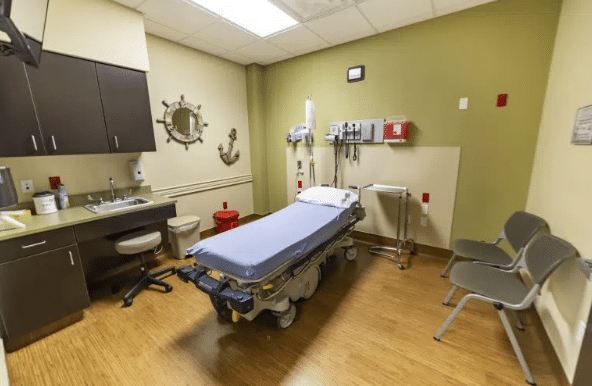General Medical Services at Surepoint ER
Medical care without the wait – no appointment needed.
Emergencies often happen without warning. Whatever the symptoms, the Surepoint Emergency Centers across North and South Texas can help.. We are dedicated to providing extraordinary care for our patients with one-on-one attention, specialized care suitable, and diagnosis/treatment. Whether you’re younger or older, you can feel confident in the superior level of patient care offered here.
When To Choose Your Nearest Emergency Room
Many people who are sick spend time debating whether they should visit an ER. The type and severity of your injury or symptoms can dictate whether or not you should seek emergency care. Common general medical symptoms that we address include fever, nausea, difficulty breathing, abdominal pain, chest pain, and signs of infection. Common medical conditions treated at Surepoint ERs include:
- Allergic Reactions
- Bronchitis
- Dehydration
- Fever/Flu
- Heat Strokes
- Migraines
- Pneumonia
- Sinusitis
When to Visit an ER Near You for an Allergic Reaction
Visiting an emergency room (ER) for allergic reactions is essential when you’re experiencing severe or life-threatening symptoms. Allergic reactions can range from mild to severe, and knowing when to seek emergency care is crucial to ensure your safety. Common symptoms of an allergic reaction can include difficulty breathing, facial swelling, itching and hives, increased heart rate, and changes in mental state.
When to Visit an ER for Bronchitis
In many cases, bronchitis can be managed with rest, hydration, and over-the-counter medications. However, there are situations when visiting an emergency room for bronchitis is necessary due to severe symptoms or complications. Some of these severe bronchitis symptoms include difficulty breathing, severe chest pain, high fever, confusion, dehydration, or concern about developing pneumonia.
When to Visit an ER for Fever/Flu or Dehydration
One of the questions we’re frequently asked is when to visit one of our local ERs for the treatment of fever/flu or dehydration. If your fever is high or accompanied by other symptoms like difficulty breathing, chest pain, dehydration, or seizures, you may need to consider finding the emergency room nearest you for medical help. You may be dehydrated if you have difficulty keeping fluids down or urinating less frequently than normal. If left untreated, this can present a risk for other health complications, including pneumonia, bronchitis, and sinus infection.
When to Visit an ER Near You for Heat Stroke
Heat stroke is a serious medical emergency that occurs when the body’s temperature regulation system fails due to prolonged exposure to high temperatures. It can be life-threatening if not treated promptly. If you suspect someone is experiencing heat stroke, you should seek immediate medical attention by calling emergency services (such as 911) and taking action to cool the person down while waiting for help. Heat stroke symptoms to look out for include severe headache or dizziness, hot and dry skin, unconsciousness or seizures, rapid heart rate or rapid breathing, and high body temperature.
When to Visit an ER for Migraines
While many migraines can be managed with at-home care, some can be debilitatingly painful and complicated. Some indications for when to consider going to the ER for a migraine, severe unrelenting pain, difficulty speaking, confusion, visual disturbances, severe nausea or vomiting, and fever. Additionally, the sudden onset of any of these migraine symptoms can be a reason to visit a nearby ER for your migraine pain.
When to Visit an ER Near You for Sinusitis or Pneumonia
Sinusitis is an inflammation of the sinuses, often caused by infections. Most cases of sinusitis can be managed through rest, hydration, over-the-counter pain relievers, and sometimes antibiotics if the infection is bacterial. You might consider visiting an ER near you for sinusitis if sinusitis symptoms are severe or if vision changes. Pneumonia is an infection that causes inflammation in the lungs. While many cases of pneumonia can be treated with rest, antibiotics, and supportive care, there are instances where emergency medical care is needed such as difficulty breathing, high fever, chest pain, and even confusion.
We’re Here For When You Need Us

When you’re searching for the nearest emergency center. You can’t go wrong with Surepoint Emergency Center. From our friendly receptionist to our caring ER doctors and nurses, we’ll put you at ease no matter what your emergency requires. Please reach out to us should you ever have any questions or concerns.





